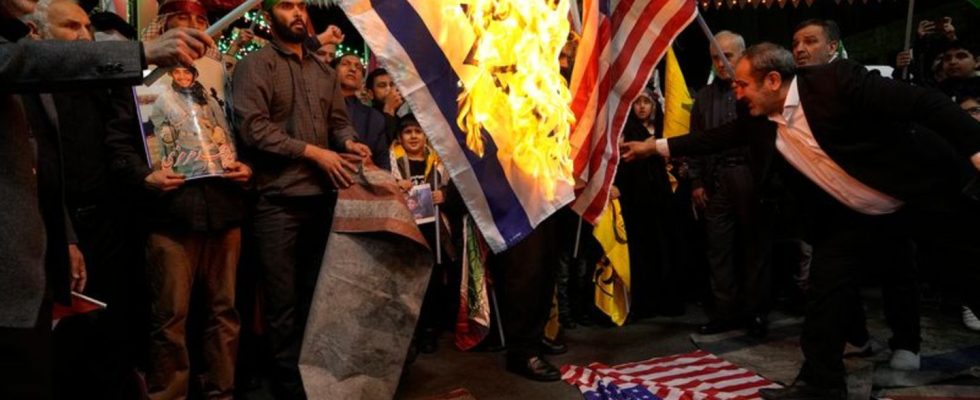Conflicts
Iranian generals killed in Syria – How does Tehran react?
In Tehran, several hundred government supporters gathered to protest, chanting “Death to Israel” and “Death to America.” photo
© Vahid Salemi/AP/dpa
They must have felt safe in the diplomatic mission. Nevertheless, two Iranian generals are killed in an attack there. Iran’s top government initially remained silent.
After the suspected Israeli airstrike on an Iranian embassy building in Syria, there is a threat of a military response Iran. Two brigadier generals and five members of the powerful Revolutionary Guard Corps (IRGC) were killed in the attack on the consular section in the Syrian capital Damascus. Israel’s government initially did not comment. Iran’s head of state Ayatollah Ali Khamenei and President Ebrahim Raisi also remained silent. Their reaction to the air raid is now awaited with both excitement and concern.
Iran’s Foreign Ministry strongly condemned the attack and blamed its arch-enemy Israel for the attack. “The Islamic Republic of Iran reserves the right to take countermeasures and will decide on the nature of the response,” Foreign Ministry spokesman Nasser Kanaani said, according to a statement from his ministry. Experts have already expressed concern that some in Iran could see the attack as a declaration of war. However, how and whether Iran’s state power will react is completely open.
“Blatant violation of the UN Charter”
After the incident, Iran’s permanent mission to the United Nations spoke of a “flagrant violation of the UN Charter, international law and the fundamental principle of the inviolability of diplomatic and consular institutions.” In a statement published on Among other things, Iran is calling for an emergency meeting of the Security Council on the incident.
At the end of December, Iranian General Sejed-Rasi Mousavi, a senior IRGC member, was killed in a suburb of the Syrian capital Damascus in a suspected Israeli airstrike. Iran’s Revolutionary Guards responded in mid-January with massive rocket attacks in retaliation against targets in Syria and Iraq. The rockets flew around 1,200 kilometers. This was also interpreted by observers as a clear signal to Israel. It would be roughly the same distance that rockets from the west of the country would need to reach Tel Aviv or Jerusalem.
Building completely destroyed
According to the Syrian state news agency Sana, the consular department building next to the Iranian embassy building was completely destroyed in the attack. Iran’s ambassador Hussein Akbari and his family were reportedly unharmed. The generals were Mohammed-Reza Sahedi and his deputy Mohammed Hadi Haji Rahimi, the Revolutionary Guards said. Sahedi was responsible for operations in Syria and Lebanon as commander of the IRGC’s foreign unit, according to Iran’s Tasnim news agency.
The Islamist Hamas, which is at war with the state after its October 7 terrorist attack in Israel, called the alleged Israeli airstrike in Damascus a “terrorist-Zionist attack” and expressed its “full solidarity with Iran and Syria in the face of it brutal Nazi aggression.” Hamas is calling on the UN Security Council to “take active action against the occupation and its criminal leaders to stop their aggression against the Gaza Strip and the region, which is adding fuel to the fire and undermining international stability and security,” it said Statement from the group at night.
“Death to Israel” and “Death to America”
In the Iranian capital Tehran, hundreds of government supporters gathered in the city center late in the evening for spontaneous protests, eyewitnesses reported. The crowd demanded revenge for the killing of the generals. They shouted, among other things, “Death to Israel” and “Death to America.”
Israel’s air force repeatedly bombs targets in neighboring Syria in an attempt to prevent Iran and its allied militias such as the Lebanese Hezbollah from expanding their military influence in the country. Attacks have increased since the Gaza war began almost six months ago. Iranian military personnel are officially only active in Syria in an advisory capacity. However, Tehran is considered the Syrian government’s most important ally alongside Russia. A civil war has been raging in the country since 2011.
The Revolutionary Guards are Iran’s elite armed forces and are considered significantly more powerful than the regular army. Founded after the Islamic Revolution in 1979, the unit is intended to prevent a coup and protect the state ideology. The IRGC also operates abroad with the so-called Al-Kuds Brigades. Israel is considered the archenemy of the Iranian government.

